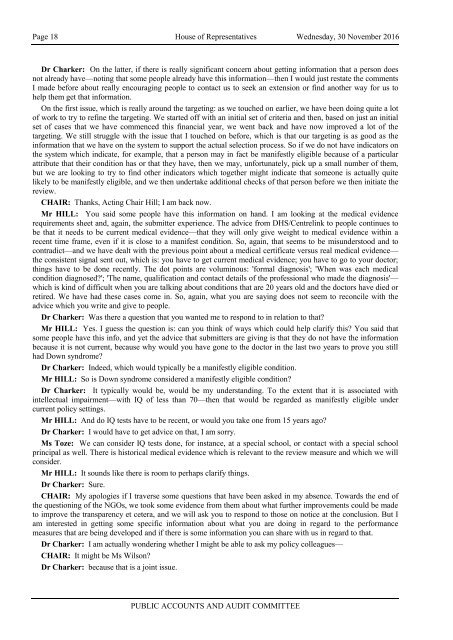Proof Committee Hansard
2hbqb7M
2hbqb7M
Create successful ePaper yourself
Turn your PDF publications into a flip-book with our unique Google optimized e-Paper software.
Page 18 House of Representatives Wednesday, 30 November 2016<br />
Dr Charker: On the latter, if there is really significant concern about getting information that a person does<br />
not already have—noting that some people already have this information—then I would just restate the comments<br />
I made before about really encouraging people to contact us to seek an extension or find another way for us to<br />
help them get that information.<br />
On the first issue, which is really around the targeting: as we touched on earlier, we have been doing quite a lot<br />
of work to try to refine the targeting. We started off with an initial set of criteria and then, based on just an initial<br />
set of cases that we have commenced this financial year, we went back and have now improved a lot of the<br />
targeting. We still struggle with the issue that I touched on before, which is that our targeting is as good as the<br />
information that we have on the system to support the actual selection process. So if we do not have indicators on<br />
the system which indicate, for example, that a person may in fact be manifestly eligible because of a particular<br />
attribute that their condition has or that they have, then we may, unfortunately, pick up a small number of them,<br />
but we are looking to try to find other indicators which together might indicate that someone is actually quite<br />
likely to be manifestly eligible, and we then undertake additional checks of that person before we then initiate the<br />
review.<br />
CHAIR: Thanks, Acting Chair Hill; I am back now.<br />
Mr HILL: You said some people have this information on hand. I am looking at the medical evidence<br />
requirements sheet and, again, the submitter experience. The advice from DHS/Centrelink to people continues to<br />
be that it needs to be current medical evidence—that they will only give weight to medical evidence within a<br />
recent time frame, even if it is close to a manifest condition. So, again, that seems to be misunderstood and to<br />
contradict—and we have dealt with the previous point about a medical certificate versus real medical evidence—<br />
the consistent signal sent out, which is: you have to get current medical evidence; you have to go to your doctor;<br />
things have to be done recently. The dot points are voluminous: 'formal diagnosis'; 'When was each medical<br />
condition diagnosed?'; 'The name, qualification and contact details of the professional who made the diagnosis'—<br />
which is kind of difficult when you are talking about conditions that are 20 years old and the doctors have died or<br />
retired. We have had these cases come in. So, again, what you are saying does not seem to reconcile with the<br />
advice which you write and give to people.<br />
Dr Charker: Was there a question that you wanted me to respond to in relation to that?<br />
Mr HILL: Yes. I guess the question is: can you think of ways which could help clarify this? You said that<br />
some people have this info, and yet the advice that submitters are giving is that they do not have the information<br />
because it is not current, because why would you have gone to the doctor in the last two years to prove you still<br />
had Down syndrome?<br />
Dr Charker: Indeed, which would typically be a manifestly eligible condition.<br />
Mr HILL: So is Down syndrome considered a manifestly eligible condition?<br />
Dr Charker: It typically would be, would be my understanding. To the extent that it is associated with<br />
intellectual impairment—with IQ of less than 70—then that would be regarded as manifestly eligible under<br />
current policy settings.<br />
Mr HILL: And do IQ tests have to be recent, or would you take one from 15 years ago?<br />
Dr Charker: I would have to get advice on that, I am sorry.<br />
Ms Toze: We can consider IQ tests done, for instance, at a special school, or contact with a special school<br />
principal as well. There is historical medical evidence which is relevant to the review measure and which we will<br />
consider.<br />
Mr HILL: It sounds like there is room to perhaps clarify things.<br />
Dr Charker: Sure.<br />
CHAIR: My apologies if I traverse some questions that have been asked in my absence. Towards the end of<br />
the questioning of the NGOs, we took some evidence from them about what further improvements could be made<br />
to improve the transparency et cetera, and we will ask you to respond to those on notice at the conclusion. But I<br />
am interested in getting some specific information about what you are doing in regard to the performance<br />
measures that are being developed and if there is some information you can share with us in regard to that.<br />
Dr Charker: I am actually wondering whether I might be able to ask my policy colleagues—<br />
CHAIR: It might be Ms Wilson?<br />
Dr Charker: because that is a joint issue.<br />
PUBLIC ACCOUNTS AND AUDIT COMMITTEE















